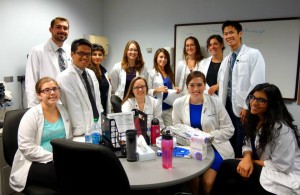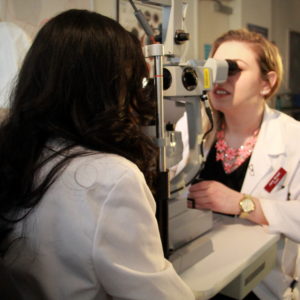 Throughout the four years of optometry school, students spend time learning about clinical skills and patient care, all in the hopes of becoming a successful doctor after graduation. As health care professionals, we define success as being able to treat patients to the best of your abilities. I mean, isn’t that the reason we joined this profession? To help people see? Of course, it doesn’t hurt to earn a few bucks along the way and pay off that mountain of student debt. When do you decide you have acquired a sufficient amount of knowledge to go out on your own? When do you become confident in your skills and your ability to treat a patient without referring to your notes or clinical literature?
Throughout the four years of optometry school, students spend time learning about clinical skills and patient care, all in the hopes of becoming a successful doctor after graduation. As health care professionals, we define success as being able to treat patients to the best of your abilities. I mean, isn’t that the reason we joined this profession? To help people see? Of course, it doesn’t hurt to earn a few bucks along the way and pay off that mountain of student debt. When do you decide you have acquired a sufficient amount of knowledge to go out on your own? When do you become confident in your skills and your ability to treat a patient without referring to your notes or clinical literature?
Optometry is a profession that promotes lifelong learning. Even after graduation, we are constantly learning about the pathophysiology of diseases and fine tuning treatment plans. The learning does not stop, so why should you? One of the biggest questions that a fourth year student faces is if they should do an additional year of residency. Many have said that one year of residency can be equivalent to 5 years of practice experience. Perhaps that is true because of the sheer volume of patients encountered in the span of a year or because you are in a setting where you will statistically see more interesting cases which adds to your clinical experience. In any case, it is a big decision to make, but it may be a simpler one than you thought.
If you ask most residency directors who they recommend should complete a residency, their answer is simple: EVERYBODY. In their years of mentoring students, they have witnessed even the most competent students flourish during a residency as they are propelled into more challenging work environments. A residency can help students fill in the gaps in their knowledge base and provide them with tools to navigate challenging cases by promoting self-directed learning.
 While it is true that every student will benefit from completing a residency, you have to really think about what a specific residency can do for you. My recommendation is to identify which topic you have really enjoyed learning about in optometry school and hope to incorporate into your daily mode of practice. It may be contact lens, pediatrics, binocular vision, ocular disease, low vision, or much more. Once you know what drives your passion, deciding to spend a year to hone in on your skills in that subject matter will be a lot simpler. A residency shouldn’t be a way to fill in a gap year, but it may feel like that if you haven’t discovered how you want to practice. If your goal is work in an OMD practice or VA, or teach at an optometry school, completing a residency will make you a more desirable candidate. If you plan to go into private practice, completing a residency in a specialty that you are passionate about could distinguish you from other optometrists in your area and be a practice builder. Figure out what drives your passion and the rest of the pieces will fall into place!
While it is true that every student will benefit from completing a residency, you have to really think about what a specific residency can do for you. My recommendation is to identify which topic you have really enjoyed learning about in optometry school and hope to incorporate into your daily mode of practice. It may be contact lens, pediatrics, binocular vision, ocular disease, low vision, or much more. Once you know what drives your passion, deciding to spend a year to hone in on your skills in that subject matter will be a lot simpler. A residency shouldn’t be a way to fill in a gap year, but it may feel like that if you haven’t discovered how you want to practice. If your goal is work in an OMD practice or VA, or teach at an optometry school, completing a residency will make you a more desirable candidate. If you plan to go into private practice, completing a residency in a specialty that you are passionate about could distinguish you from other optometrists in your area and be a practice builder. Figure out what drives your passion and the rest of the pieces will fall into place!
Many of you who are contemplating a year of residency may worry that it is yet another year with minimal income, but it is income nonetheless! As students, we are already trained to live on a student (0$) budget so any positive income will be an upgrade. For those who have family or financial obligations or have a full time job offer after graduation, you may think that completing a residency is not the right decision for you. True, every student has to recognize their obligations, but it is also true that every student will become a better doctor after a year of residency training.
Residency may seem like light years away to first and second years, an attainable dream to third years, and fork in the road to fourth years. This decision is not one that is made overnight; every year in optometry school shapes your motivation. It is never too early to start thinking about how you want to practice, and it is never too late. Good luck to everyone applying to residencies this cycle – you’ve made the right choice!
Residency information:

